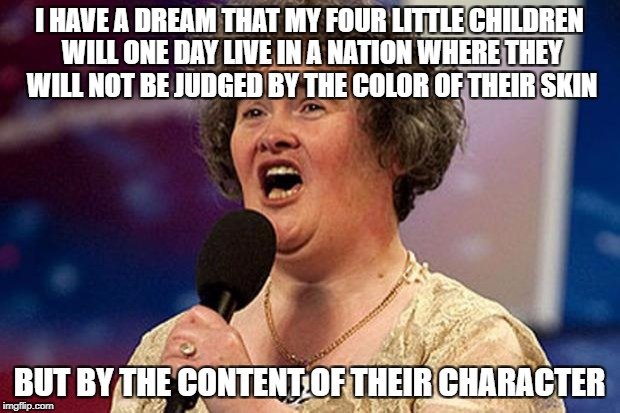THE HYPOTHESIS
I went to givewell.org to search for Property and Environment Research Council, a company I want to work for. Their search engine is down, but I noticed a tab labeled “Our Mistakes.” Intrigued, I clicked on it. They list their mistakes, major and minor. I was very surprised to see they listed diversity, or rather lack of it, as their top mistake:

When you click on it, they briefly explain their lament:

I am surprised at this behavior by Julia Galef’s podcast sponsor. If you don’t know who Julia Galef is, she’s very rational.
Let me elaborate.
ANTITHESIS
Diversity is often defined in today’s Social Justice Warrior climate as diversity of race, gender, and sexual orientation, among other attributes humans are born with and cannot control. Allow me now to share the words of one of the few people I attribute the title “Social Justice Warrior” non-pejoratively:

Just kidding. Susan Boyle didn’t say (sing) those forgotten words.
THESIS
Now, note that Givewell didn’t define diversity. One can only assume what they mean by this. But I think we should all agree, especially in this 21st century, that diversity of things you don’t control doesn’t indicate that you’ll be a good employee (or person); only quality of character indicates that.
Being the scientist and statistician that I am, I immediately clicked on their Full-time staff page and did a quick count of “diverse” staff. Now, the only variable I can determine from this page is gender. Here’s what I found:
There are 20 full-time staff members. There are 9 men and 11 women. As far as I can tell, a near 50/50 split for gender is perfect diversity, if that’s your goal. Which it shouldn’t be. At least, not according to Martin Luther King.



It's funny, one of the original reasons that organizations would strive for diversity was to bring different perspectives to bear on innovation and problem solving. Race, gender, geography, and socio-economic status were proxies for diversity of thought, because that's not something you can easily measure.
Somewhere along the way, diversity of thought got forgotten, and now organizations will gladly sacrifice diversity of thought. In fact, it often seems that most organizations have a strong preference for conformity of thought.
As far as I'm concerned, if you don't have diversity of ideas, then you don't actually have diversity, in any meaningful sense. If you're interested, the Heterodox Academy does some good work in this area.
On another note, good luck getting into PERC. I think that would be awesome. Not sure if you saw it, but I wrote about free market environmentalism and mentioned PERC in another article recently.
Yes I agree that most organizations seem to prefer conformity of thought. From anecdotal evidence, this seems to be the case for both conservatives and liberals.
I recently found out about the Heterodox Academy and have started following their work! It's an excellent idea, just what is needed in academia right now.
Thanks for the good luck wishes!